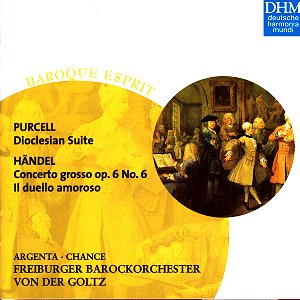


BUY NOW
HENRY PURCELL (1659-1695)
Dioclesian Suite [1690]
GEORG FRIEDRICH HANDEL (1685 - 1759)
Concerto grosso op. 6 no. 6 [1739]
Il duello amoroso [1708]
Henry Purcell
Orchestral suite from “Dioclesian”
With songs for soprano, countertenor
and B.c.
1. Overture
2. a) Dance
b) Song “If music be the
food”
3. a) Dance of Bacchanals
b) Trumpet tune
4. a) Prelude
b) Song “Oh how happy”
c) Hornpipe
5. Dance of the Furies
6. First music
7. Duet “Lost is my quiet”
8. a) Prelude
b) Song “Let the soldiers
rejoice”
c) Act tune
9. Chaconne
10. a) Second Music
b) Paspe
c) Chair dance
Georg Friedrich Handel
Concerto grosso op. 6 No. 6 G
Minor
11. Largo e affettuoso
12. A tempo giusto
13. Musette - Larghetto
14. Allegro
15. Allegro
Georg Friedrich Handel
“Il duello amoroso”, HWV 82
16. Sonata: Allegro Menuetto
17. Recitativo (Daliso)
18. Aria (Daliso)
19. Recitativo (Amarilli)
20. Aria (Amarilli)
21. Recitativo (Daliso / Amarilli)
22. Aria (Amarilli)
23. Recitativo (Daliso)
24. Aria (Daliso)
25. Recitativo (Amarilli / Daliso)
26. Aria a 2 con Ritornello (Amarilli
/ Daliso)
Nancy Argenta, soprano
Michael Chance, countertenor
![]() Freiburger Barockorchester, Gottfried vor der Goltz
Freiburger Barockorchester, Gottfried vor der Goltz
Rec. January 1993, Maria Minor,
Utrecht, Netherlands.
![]() DHM 05472 77858 2 [68.48]
DHM 05472 77858 2 [68.48]